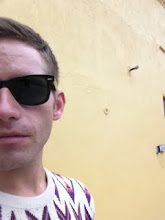
Where did the lazy, cozy, red-wine-soaked winters of yore go? So far this has been a frantic, angry-badger-faced season for me, which means I've only now caught up on last year's films. Here's my list of 2010's best:
1. Winter's Bone
Call it Ozark noir. Jennifer Lawrence stars as a ceaselessly determined teenager who must hunt down her meth-cooking father to keep her family together. As she portrays this search through backwoods Appalachia, writer/director Debra Granik captures her subject and setting with a documentarian's eye. It's atmospheric, moody, and riveting. Lawrence, who played a similarly precocious and world-weary teenager in The Burning Plain, makes her character's pluck endearing and believable, while Dale Dickey and John Hawkes offer indelible portraits of not-entirely-unsympathetic figures entangled in the meth business.
2. Black Swan
Sure, I can handily buy all the "it's about the artistic process" arguments, but for me, this is a blood-soaked psychological thriller, as gleefully over the top as Carrie or Whatever Happened to Baby Jane?. Darren Aronofsky has never been one for subtlety, and thank goodness. Natalie Portman has never been better as a ballerina losing grips on reality (she relishes the stage like Elizabeth Berkeley did the stripper pole in Showgirls ... that's not a knock). Barbara Hershey and Vincent Cassel haven't gotten the praise they deserve as Portman's manipulative mother and director, respectively.
3. Somewhere
Sometimes I think about what it must be like to be Sofia Coppola.
"But Daddy, I want to make a costume drama!"
"When I was in the front row at the Anna Sui show ..."
"I loved that song 1901, off my husband's last album."
It's easy to hate on Coppola, but perhaps that's because we all wish we were hollywood progeny, fashion icons, and indie rock wives. Also, that we could write delicate, minimalist screenplays and bring them to the screen with grace and visual splendor. That's just what Coppola's done with Somewhere, her best film since Lost in Translation (the less said about Marie Antoinette the better). It's easily her most minimal, defined by dialogue-less scenes, a rudderless narrative flow, and relationships are implied rather than stated. I love the ambiguity as well as apathy for traditional narrative propulsion. Stephen Dorff stars as a disenchanted hollywood star living in the famed, decadent Chateau Marmont. Elle Fanning (she of the Dakota Fannings) is his charming, precocious daughter. They interact, disconnect, go to Milan. Their relationship -- and Dorff's lack of relationships with everyone -- feels quintessentially LA. It reminds me of the line from Less Than Zero, "People are afraid to merge."
4. White Material
I've written about Claire Denis' brilliant examination of post-colonialism before, so I'll keep it brief. Isabelle Huppert (always great) is the steely operator of a coffee farm in a crumbling African nation. It's abstract, non-traditional, haunting.
5. I Am Love
It had me at hello. A snow-blanketed Milan, John Adams' lavish score, and vintage credits. A fitting start to an opulent send-up to old style melodrama. Tilda Swinton (who else?) stars as a the matriarch of a dynastic Italian clan. Betrayal, dueling loyalties, clandestine love. It's all there. The soap opera is fun, but the technical marvels are the reasons to stay - costumes to die for and the most appetizing prawn I've ever seen.
6. Animal Kingdom
When his mother overdoses, a teen is forced to move in with his only family -- a notorious gang of bank robbers. Similar to this year's The Town, it's a fairly traditional crime film that explores loyalty, honor and family. The white trash Australian setting is fascinating and Jackie Weaver deserves all the praise she's receiving as the motley crew's duplicitous matriarch.
7. The Social Network
Yeah, it's been overpraised. Which is too bad, because there's now a bit of a backlash against this witty, insightful look at flawed ambition and social alienation. Few directors working today possess David Fincher's skill and precision, and when paired with Aaron Sorkin's rapid-fire dialogue (so good it warrants comparison to Preston Sturges), it's hard to beat. The opening confrontation between Jesse Eisenberg and Rooney Mara could easily be one of the best first scenes ever, and contains my favorite line of the year, "Dating you is like dating a Stairmaster."
8. Shutter Island
A real treat for lovers of old film, Martin Scorsese approaches this psychological thriller with an eye to Hitchcock and Georges Franju. The technical merits are peerless, and supporting turns from Ben Kingsley and Max Von Sydow are over-the-top in a great way. This is also, I think, the better of DiCaprio's "tortured soul due to late, crazy wife" performances.
9. Inception
Now for the other DiCaprio as a "tortured soul due to late, crazy wife" film. With The Dark Knight and this follow-up, Christopher Nolan deserves credit for pushing blockbuster filmmaking into an uncharted realm. It's also refreshing to see an original idea (not a franchise, reboot, etc.) get the big budget treatment (even if every line Ellen Page says is a piece of exposition). And as much as this isn't a performance piece, why people haven't been talking about Marion Cotillard's affecting work as Leo's luminous (albeit slightly crazy and dead) wife is beyond me.
10. Exit from the Gift Shop
An engaging look at the art of the scam, which itself might just be a scam. It looks at the rise of street art and the mysterious (and potentially fictitious) Banksy, who along with Shepard Fairey are the empresarios of the movement. It's all about what's art and who decides, or as Jennifer Egan put it in the excellent A Visit from the Goon Squad, "When does a fake mohawk become a real mohawk? Who decides?"























